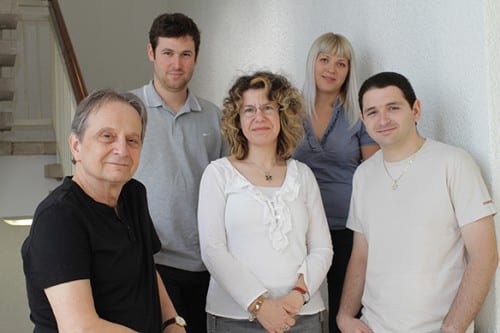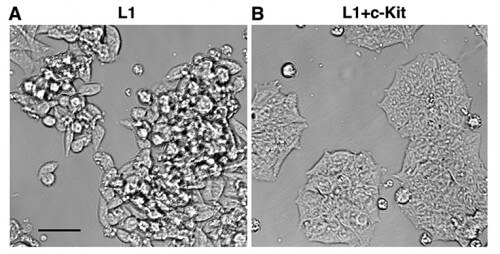A murderer becomes a lifesaver - although it sounds like a twist in an action movie, scientists at the Weizmann Institute have discovered that this type of scenario can also occur in cancer. In a study recently published in the journal Cancer Research, they found that a gene known to cause cancer (an onco-gene) can prevent the deadly spread of the cancerous tumor in the later stage of the disease.

From the right: Benny Shapiro, Dr. Nancy Gebert and Prof. Avri Ben-Zev. Standing in the back: Anna Shoab and this wave. "The good hero". Photo: Weizmann Institute
A murderer becomes a lifesaver - although it sounds like a twist in an action movie, scientists at the Weizmann Institute have discovered that this type of scenario can also occur in cancer. In a study recently published in the journal Cancer Research, they found that a gene known to cause cancer (an onco-gene) can prevent the deadly spread of the cancerous tumor in the later stage of the disease.
The aim of the study was to identify genes involved in the formation of colon cancer metastases. In an experiment on mice, which were injected with cells from human cancerous tumors, the scientists decoded a long chain of biochemical events leading to the formation of metastases. The chain begins with a mutation, found in over 80% of colon cancer patients, which disrupts a certain signaling mechanism in the cells. They discovered that the disruption, in itself, increases the level of a gene responsible for cell adhesion, called L1, and thus increases the motility of the cells at the invasive front of the tumor. This ultimately helps to send metastases to distant organs, especially the liver.
Furthermore, the scientists discovered that L1 also affects the expression of one of the genes in the signaling chain - the gene called c-Kit, which in this case prevents the formation of metastases. When the expression level of c-Kit was low, the tumors metastasized to the liver, but when the scientists increased the level of c-Kit - no metastases were formed, even in the presence of L1. The c-Kit gene prevents the formation of metastases by encouraging the cells to adhere to each other in an orderly manner, the way the cells are organized in normal mucous tissues, and not the way invasive cancer cells behave.
The finding was extremely surprising, since c-Kit is known as an oncogene, that is, a cancer-causing gene. In other words, it turned out that the same gene that causes cancer at the beginning of the development of the tumor, including the increased proliferation of colon cancer cells, prevents the spread of these cells as metastases to the liver at later stages.
Later it became clear that these findings are relevant to humans. When the scientists examined the genomic profile of tumors from 300 colon cancer patients, they found that c-Kit levels in the intestinal tissues were lower in all patients compared to the intestines of healthy people.

The research team, led by Prof. Avery Ben-Zev from the Department of Molecular Biology of the Cell, included Dr. Nancy Gebert, Anna Shoab, Dr. Amir Ben-Shmuel, Gal Heza and Esther Bakosh. The research was carried out in collaboration
Cooperation with Dr. Michal Shafer from Prof. Eitan Domani's group, from the Department of Physics of Complex Systems.
The study does reveal one of the molecular mechanisms by which colon cancer sends its metastases to the liver, the most common site for its spread, but it also points to the cancer process in all its complexity. It turns out that the same gene can be the "bad hero" at one stage of cancer and the "good hero" at another stage. The scientists of the Weizmann Institute of Science conclude from this that great caution is required in cancer treatments directed against certain oncogenes. In particular, when a drug is given to suppress c-Kit, in order to prevent the spread of cancer, it must be ensured that the treatment does not disrupt the function of that gene in preventing the formation of metastases. This conclusion is supported by the findings of other scientists, who recently discovered that another common oncogene, c-Myc, behaves in the same dual way as c-Kit: it increases the proliferation of breast cancer cells, but when it is overexpressed, it prevents their proliferation and the creation of The metastases.
